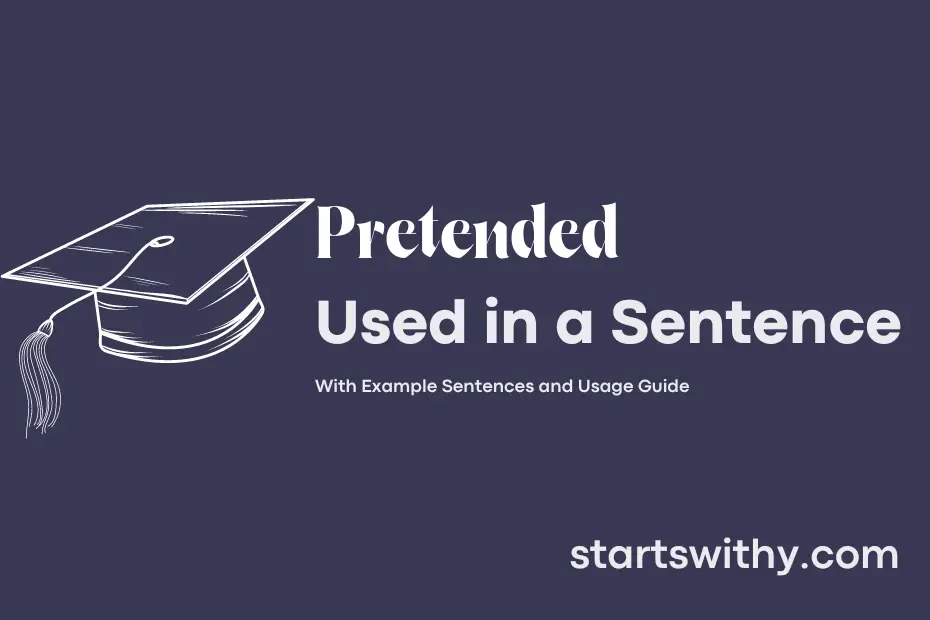Have you ever used the word “pretended” in a sentence? “Pretended” is a verb that denotes an action of pretending or acting as if something is true, even though it may not be.
When someone uses the word “pretended,” they are implying that someone is putting on a false appearance or behavior to deceive others or to create a certain impression. It is often used to describe scenarios where individuals act in a way that is not truly reflective of their feelings or intentions.
7 Examples Of Pretended Used In a Sentence For Kids
- I pretended to be a doctor and gave teddy bear a check-up.
- Teddy bear pretended to be a king and wore a crown.
- We pretended to be astronauts and flew to space in our imagination.
- The cat pretended to be a tiger and roared loudly.
- I pretended to be a chef and cooked a delicious pretend meal.
- The birds pretended to be airplanes and flew in the sky.
- My friend pretended to be a fairy and sprinkled magic glitter everywhere.
14 Sentences with Pretended Examples
- Pretended to understand the complex math problem in class, hoping no one would notice.
- We pretended to have read the entire novel for the literature seminar, but we actually just skimmed through the summary.
- Pretended to know all about the upcoming campus event, trying to blend in with the crowd.
- Our group pretended to have studied for the group presentation when we actually did it last minute.
- She pretended to be listening to the professor during the lecture, but was actually scrolling through social media.
- Pretended to be interested in the guest speaker’s talk, but was actually daydreaming about the weekend.
- He pretended to have attended all the workshops required for the certification, but had skipped a few.
- Pretended to be confident during the debate competition, even though I was nervous inside.
- Their excuses were flimsy as they pretended to have submitted the assignment on time.
- Pretended to be busy with assignments when friends invited me to a movie night, as I needed to catch up on work.
- She easily pretended to understand the foreign language being taught in the elective course, impressing the professor.
- We all pretended to be awake and attentive during the early morning lecture, despite having pulled an all-nighter.
- Pretended to have a vast knowledge of the topic during the group discussion, to boost my confidence.
- He pretended to be an expert in the subject during the study session, but secretly struggled with the concepts.
How To Use Pretended in Sentences?
To Pretended means to make believe or feign. Here is a guide on how to use this word in a sentence:
-
Identify the situation: Think about a scenario where someone is acting or behaving falsely.
-
Select the appropriate context: Choose a context where someone is pretending to be something they are not.
-
Construct the sentence: Use the word Pretended in a sentence that reflects the chosen context. For example, “She pretended to be interested in his story even though she was bored.”
-
Practice using the word: Try using the word Pretended in different sentences to get comfortable with its meaning and usage.
-
Pay attention to tenses: Ensure that you use the appropriate tense when using the word Pretended in a sentence. For example, “He pretended to be sick yesterday.”
-
Check for clarity: Make sure that your sentence conveys the intended meaning clearly and effectively.
-
Expand your vocabulary: Look for synonyms of the word Pretended to enhance your vocabulary and understanding of its usage.
Remember, practice makes perfect! Keep using the word Pretended in your sentences to become more familiar with its meaning and usage.
Conclusion
In summary, the examples of sentences with ‘pretended’ illustrate instances where individuals feigned certain actions, emotions, or beliefs to conceal their true intentions or manipulate a situation. Whether pretending to be interested in a conversation, pretending to agree with someone’s opinions, or pretending to be someone they’re not, these examples highlight the use of deception for personal gain or to avoid confrontation.
Through these sentences, it becomes clear that pretending is a common social behavior that can serve various purposes, both positive and negative. It reminds us of the complexities of human interactions and the importance of authenticity in fostering genuine connections. Overall, the examples emphasize the role of pretense in shaping our relationships and interactions with others.



